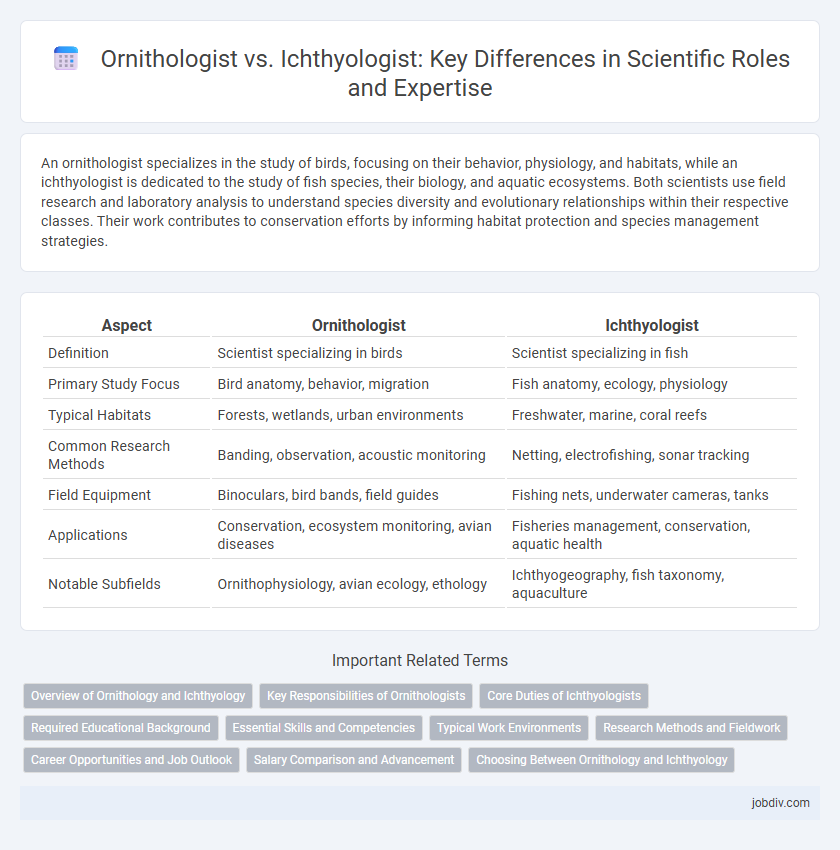An ornithologist specializes in the study of birds, focusing on their behavior, physiology, and habitats, while an ichthyologist is dedicated to the study of fish species, their biology, and aquatic ecosystems. Both scientists use field research and laboratory analysis to understand species diversity and evolutionary relationships within their respective classes. Their work contributes to conservation efforts by informing habitat protection and species management strategies.
Table of Comparison
| Aspect | Ornithologist | Ichthyologist |
|---|---|---|
| Definition | Scientist specializing in birds | Scientist specializing in fish |
| Primary Study Focus | Bird anatomy, behavior, migration | Fish anatomy, ecology, physiology |
| Typical Habitats | Forests, wetlands, urban environments | Freshwater, marine, coral reefs |
| Common Research Methods | Banding, observation, acoustic monitoring | Netting, electrofishing, sonar tracking |
| Field Equipment | Binoculars, bird bands, field guides | Fishing nets, underwater cameras, tanks |
| Applications | Conservation, ecosystem monitoring, avian diseases | Fisheries management, conservation, aquatic health |
| Notable Subfields | Ornithophysiology, avian ecology, ethology | Ichthyogeography, fish taxonomy, aquaculture |
Overview of Ornithology and Ichthyology
Ornithology is the branch of zoology focused on the study of birds, encompassing their behavior, physiology, and ecological importance. Ichthyology is dedicated to the study of fish species, focusing on their anatomy, taxonomy, and evolutionary biology. Both fields contribute critical knowledge to biodiversity conservation and environmental science.
Key Responsibilities of Ornithologists
Ornithologists specialize in the study of birds, focusing on their behavior, physiology, migration patterns, and conservation status to understand avian ecology. They conduct field research, monitor bird populations, and develop strategies to protect endangered species, contributing to biodiversity preservation. Their work often involves data collection, analysis of bird vocalizations, and collaboration with environmental agencies to influence habitat conservation policies.
Core Duties of Ichthyologists
Ichthyologists specialize in the study of fish species, emphasizing their biology, behavior, and ecology in both freshwater and marine environments. They conduct research on fish anatomy, genetics, population dynamics, and environmental impact, often using advanced tools like sonar and underwater cameras for data collection. Their core duties include species identification, habitat assessment, conservation efforts, and contributing to sustainable fisheries management.
Required Educational Background
Ornithologists typically require a bachelor's degree in biology, zoology, or environmental science, often followed by a master's or Ph.D. specializing in ornithology, avian biology, or ecology. Ichthyologists also pursue degrees in biology or marine science, with advanced studies focusing on ichthyology, fisheries science, or aquatic ecology. Both professions emphasize extensive field research experience and strong foundations in taxonomy, anatomy, and ecology relevant to birds or fish, respectively.
Essential Skills and Competencies
Ornithologists require expertise in avian behavior, anatomy, and ecology, alongside skilled use of field observation techniques and bird banding methods. Ichthyologists must possess deep knowledge of fish physiology, aquatic ecosystems, and taxonomy, combined with proficiency in sampling equipment and laboratory analysis. Both professions demand strong data collection, statistical analysis, and scientific communication skills to advance their respective fields effectively.
Typical Work Environments
Ornithologists primarily conduct field research in diverse habitats such as forests, wetlands, and coastal areas, often working outdoors to study bird behavior and ecology. Ichthyologists typically perform their research in aquatic environments, including freshwater rivers, lakes, and marine ecosystems, as well as laboratory settings for physiological and genetic analysis. Both professions may collaborate with research institutions, universities, and conservation organizations to advance species knowledge and environmental preservation.
Research Methods and Fieldwork
Ornithologists primarily utilize bird banding, acoustic monitoring, and visual surveys to study avian behavior, migration, and population dynamics, often conducting fieldwork in diverse habitats such as forests, wetlands, and grasslands. Ichthyologists employ techniques like electrofishing, net sampling, and underwater videography to examine fish species, their ecology, and aquatic biodiversity, frequently performing research in freshwater and marine environments. Both fields integrate laboratory analysis and remote sensing data to complement in situ observations and enhance ecological and evolutionary understanding.
Career Opportunities and Job Outlook
Career opportunities for ornithologists primarily revolve around wildlife conservation, ecological research, and environmental consulting, with increasing demand driven by global biodiversity initiatives. Ichthyologists find job prospects in fisheries management, aquatic ecosystem research, and marine conservation agencies, benefiting from the growing emphasis on sustainable fisheries and aquatic resource management. Both fields offer competitive salaries, but ichthyologists may experience broader opportunities in government and private sectors due to the economic importance of fisheries.
Salary Comparison and Advancement
Ornithologists typically earn a median annual salary of around $65,000, while ichthyologists average slightly higher at approximately $70,000 due to specialized research roles in aquatic ecosystems. Advancement opportunities for ichthyologists often include lead research positions and consultancy in marine conservation, whereas ornithologists may progress towards academic professorships or wildlife management leadership. Salary growth in both fields is influenced by advanced degrees, research publications, and involvement in international projects.
Choosing Between Ornithology and Ichthyology
Choosing between ornithology and ichthyology depends on whether the focus is on studying birds or fish, respectively. Ornithologists specialize in avian biology, behavior, and ecology, often conducting fieldwork involving bird identification and migration tracking. Ichthyologists study fish species diversity, physiology, and aquatic ecosystems, frequently engaging in underwater research and habitat conservation efforts.
Ornithologist vs Ichthyologist Infographic

 jobdiv.com
jobdiv.com